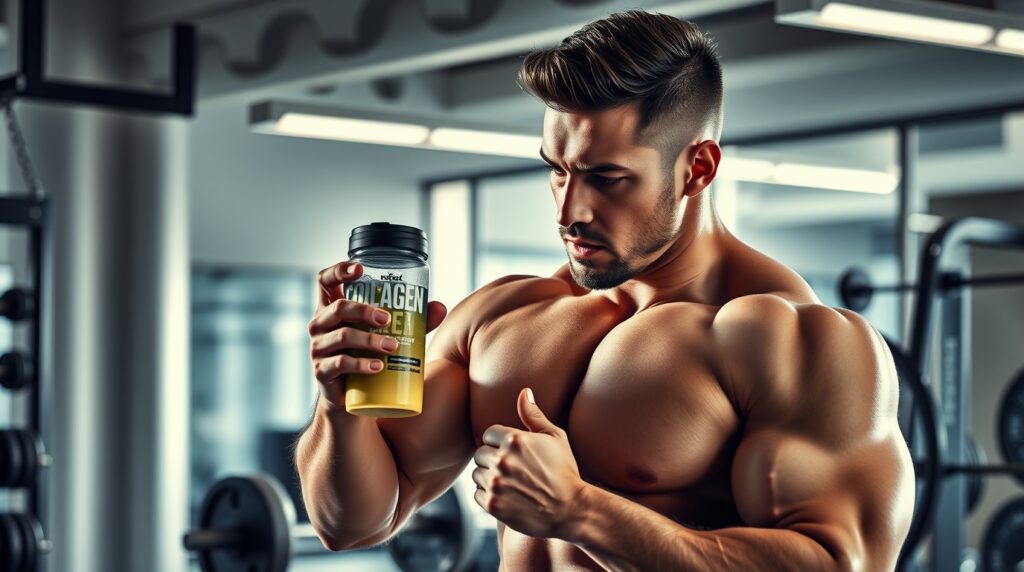Order Online Today!
Secure Online Payments!
Fast & Affordable Nationwide Delivery!
Muscle Mecca Article
Boost Your Body’s Health with Collagen Supplements Explained

Collagen has recently become a buzzword among fitness enthusiasts and beauty aficionados alike, thanks to its profound health and aesthetic benefits. Collagen supplements, in particular, have gained widespread popularity as an essential addition to daily wellness routines. But what exactly is collagen? As the most abundant protein in the human body, collagen plays a crucial role in maintaining the structural integrity of skin, muscles, bones, and connective tissues. It acts like the body’s natural glue, ensuring strength, elasticity, and resilience throughout various systems, making it vital for overall health and well-being.
What Is Collagen and Why Is It Important?
Collagen is a structural protein that constitutes approximately 30% of the body’s total protein content. It lays the groundwork for essential components like skin, muscles, bones, tendons, and connective tissues, serving as a fundamental building block for the body’s infrastructure. One of collagen’s key roles is maintaining skin elasticity, which helps keep the skin firm and youthful. Additionally, collagen supports muscle strength and growth while aiding in the repair and regeneration of tissues, making it indispensable for overall recovery and health.
Among the various types of collagen, Type I Collagen is the most abundant, accounting for nearly 90% of the body’s total collagen. This type is especially vital for maintaining the integrity of the skin, tendons, and organs. It provides tensile strength to tendons, contributes to the skin’s smooth and resilient texture, and supports the structure of critical organs, underscoring its importance in the body’s functionality.
The Benefits of Collagen Supplements
For Skin
Collagen supplements have garnered attention for their remarkable effects on skin health. Regular supplementation has been shown to enhance skin hydration and improve elasticity, leading to a more youthful and supple appearance. Studies suggest that hydrolysed collagen, in particular, can significantly reduce visible signs of aging, such as fine lines and wrinkles. One notable study published in Skin Pharmacology and Physiology found that individuals who took hydrolysed collagen for eight weeks experienced noticeable improvements in skin moisture and elasticity compared to those who did not. These benefits demonstrate the vital role collagen plays in maintaining a vibrant complexion.
For Bones and Joints
Maintaining strong bones and flexible joints is crucial for overall mobility, and collagen supplements can play a pivotal role in this. Collagen helps preserve bone mineral density, which is especially vital for postmenopausal women who may experience bone loss due to hormonal changes. Furthermore, collagen supports joint health by replenishing cartilage, the tissue that cushions joints and allows smooth movement. Research has shown that regular collagen supplementation can alleviate joint discomfort and improve mobility, making it a valuable aid for those with joint issues or arthritis.
For Muscles and Recovery
Collagen is a key protein for muscle repair and recovery, making it an essential supplement for athletes and fitness enthusiasts. Research reveals that collagen peptides can support the repair of muscle tissue after exercise and reduce recovery time, allowing for improved athletic performance. Additionally, collagen supplementation has been linked to an increase in muscle mass, particularly in combination with resistance training, as well as reduced risk of injury. This makes collagen a beneficial tool for individuals pursuing strength and endurance goals.
Digestive Health
Collagen supplements also profoundly impact digestive health by supporting the integrity of the intestinal lining. A healthy gut lining is essential for proper nutrient absorption and a well-functioning immune system. Collagen plays a role in maintaining this barrier, reducing the likelihood of inflammation or conditions such as leaky gut syndrome. By fortifying the digestive tract, collagen contributes to overall gut health, which is increasingly recognised as a foundation for broader well-being.

Signs of Collagen Decline
Collagen production naturally declines as we age, with noticeable reductions often starting around the age of 30. This decrease accelerates significantly in women after menopause due to hormonal changes, particularly the drop in estrogen levels. The reduction in collagen levels can manifest in several physical signs, such as the appearance of wrinkles, decreased skin elasticity, joint pain, and muscle stiffness. These changes highlight the crucial role collagen plays in maintaining healthy and youthful-looking skin, as well as supporting joint and muscle function.
Lifestyle habits can further exacerbate collagen decline. Smoking is a major contributor, as it inhibits collagen synthesis and introduces harmful toxins that damage connective tissue. Prolonged UV exposure accelerates collagen breakdown by triggering the release of enzymes that degrade skin fibres. Additionally, excessive sugar consumption leads to glycation, a process that damages collagen proteins and reduces their flexibility. Recognising these factors and adopting healthier lifestyle habits can help mitigate collagen loss and its associated effects.

What Types of Collagen Supplements Are There?
Collagen supplements are available in various types and forms, each catering to specific needs and preferences. The most common types of collagen found in supplements include Type I, II, and III. Type I collagen primarily supports skin, hair, nails, and bones. Type II collagen focuses on joint health and cartilage, while Type III collagen enhances skin elasticity and supports the structural integrity of organs.
These types of collagen supplements are often offered in different forms, such as peptides (also known as hydrolysed collagen), powders, capsules, and liquids. Collagen peptides are already broken down into smaller chains of amino acids, making them highly bioavailable and easier for the body to absorb. Powders are a versatile option, allowing users to mix them into drinks or recipes, while capsules provide a convenient and mess-free alternative. Liquid collagen, meanwhile, is absorbed swiftly and is often favoured for its efficiency and portability.
It is important to note that vegan-friendly options, often labelled as “collagen-boosting” supplements, do not contain pure collagen. This is because collagen is derived primarily from animal sources like bovine or marine tissues. Instead, vegan collagen-boosting supplements include plant-based ingredients that support the body’s natural collagen production, offering an ethical alternative for those who avoid animal products.
Are Collagen Benefits Backed by Science or Hype?
Collagen’s role in promoting skin elasticity and hydration, as well as supporting joint health, is well-documented in studies, making it a popular choice for individuals seeking these benefits. Many clinical trials have reported improved skin texture, reduced wrinkles, and enhanced joint mobility, especially among older adults and those with specific joint conditions.
However, it is important to acknowledge that much of the research is funded by the collagen industry, which may introduce bias in study designs or results. Additionally, the effectiveness of collagen supplements can vary significantly between populations. For instance, postmenopausal women may experience tangible improvements in skin and bone health, while young athletes may see differing outcomes. This variability underscores the need for a cautious and personalised approach when considering collagen supplementation as part of a wellness routine.
How Fitness Enthusiasts Can Incorporate Collagen into their Routine
Mixing collagen powders into coffee, smoothies, or oatmeal is an effortless way to enhance a fitness-focused diet. These versatile options integrate seamlessly into daily routines, providing convenience for individuals with active lifestyles. Fitness enthusiasts are encouraged to consume 5-10g of collagen per day, as this dosage is often considered ideal for supporting joint health, muscle recovery, and skin elasticity.
Consistent use is critical to achieving optimal results since collagen synthesis requires time and regular intake to produce noticeable benefits. Additionally, pairing collagen supplements with a high-protein diet can yield synergistic effects, as amino acids from dietary protein help support overall muscle repair and collagen production. By incorporating collagen in this way, fitness enthusiasts can actively contribute to their wellness goals while maintaining a balanced and nutrient-rich diet.
Looking to elevate your fitness and wellness routine?
Discover the power of premium collagen supplements at Muscle Mecca SA. Packed with quality ingredients to support your joints, skin, and muscle recovery, our collagen products are the perfect addition to your health regimen. Visit Muscle Mecca SA today and take the first step towards a stronger, healthier you!
